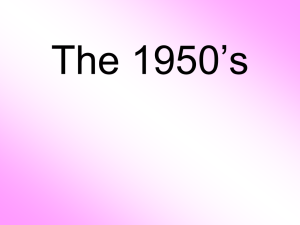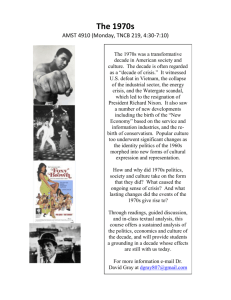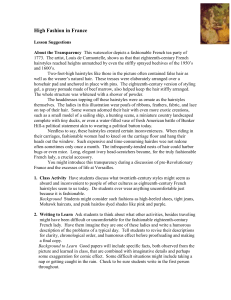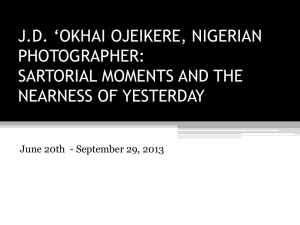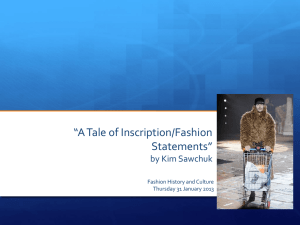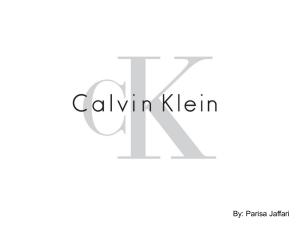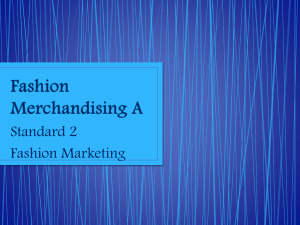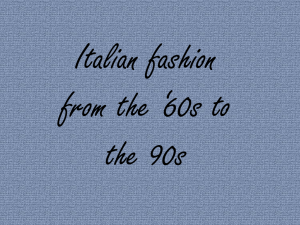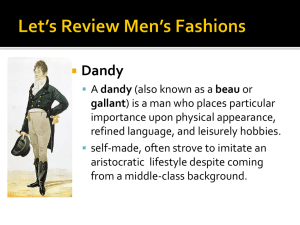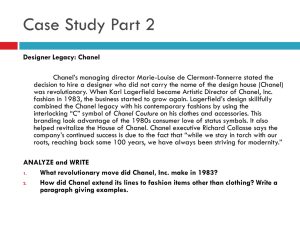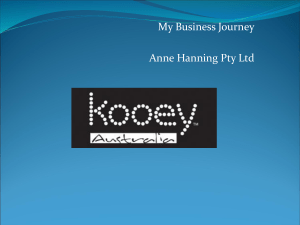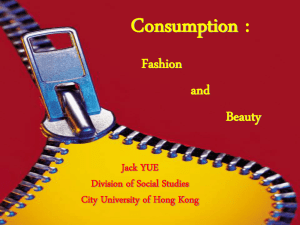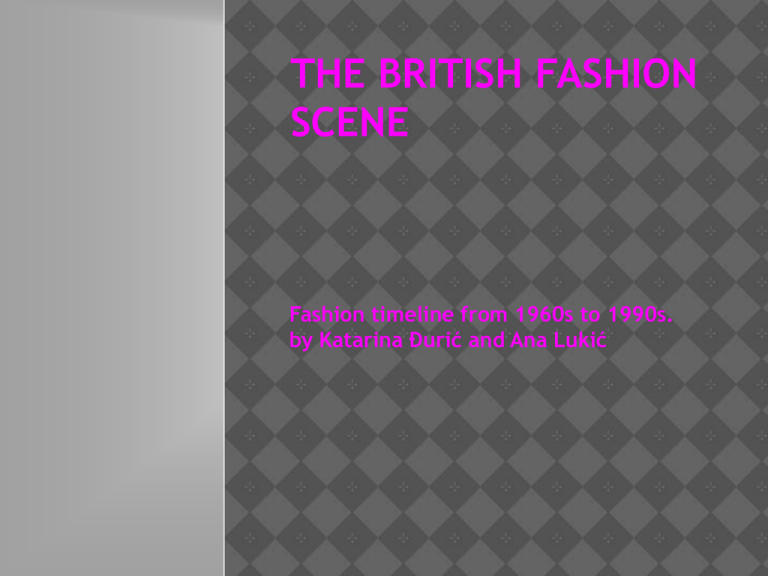
THE BRITISH FASHION
SCENE
Fashion timeline from 1960s to 1990s.
by Katarina Đurić and Ana Lukić
1960s
The “swinging sixties” was a decade of fashion revolution in London, due
to social and political changes and influence of the Hippie movement, the
Beatles and various celebrities.
The Beatles had an enormous influence on young men’s fashions
and hairstyles, and brought mop-top haircut, the Beatle boots
and the Nehru jacket.
The hippie movement also had a strong influence on clothing
styles, including bell-bottom jeans, tie-dye and batik fabrics, as
well as paisley prints.
The bikini finally came into fashion in 1963 after being featured
in the film Beach Party.
Mary Quant invented the mini-skirt which became the rage in the
late 1960s, and named it after her favourite car.
When it comes to hairstyles, men usually chose pompadour,
the crew cut, the flattop hairstyle, the tapered hairstyle, and
short, parted hair in the early part of the decade, to longer
parted hairstyles with sideburns towards the latter half of the
decade.
Women's mainstream hairstyles ranged from beehive hairdos, the
bird's nest hairstyle, and the chignon hairstyle in the early part of
the decade, to very short styles popularized by Twiggy and Mia
Farrow in Rosemary's Baby towards the latter half of the decade.
African-American hairstyles for men and women included
the afro.
1970s
Today everyone knows what punk fashion is, but in 1970 it didn't
exist. Punk first emerged in the mid 1970s in London as an anarchic and
aggressive movement. About 200 young people defined themselves as an
anti-fashion urban youth street culture. Closely aligned was a music
movement that took the name punk.
Strong musical influence marked this era. The first punk band is
usually thought to be the Ramones from 1976.
This was taken up in Britain by bands also influenced by the pub
rock scene, like the Sex Pistols and The Clash, particularly in
London, blending simple aggressive sounds and lyrics
with clothing styles and a variety of anti-authoritarian ideologies.
Some small elements that spoke of a person's punk roots were
safety pins, black PVC or tartan bondage trousers, leopard-print
t-shirts, mohawk, spikes or harshly dyed hair, filthy tennis-shoes,
or pointy Beatle boots.
During this period leotards, eyeglasses and three-piece suits also
became very popular.
In the 1970s, making one of the popular hairstyles for a women
didn't take a lot of time. These hairstyles, including Afro
hairstyle, Shaggy Hairdo and Feathered hair were said to be
perfect when you're on-the-go and would still keep your
expressive style in-check.
1980s
Many styles from the late 1970s remain fashionable in the early
1980s. In the 1970s, the silhouette of fashion tended to be
characterized by close fitting clothes on top with wider, looser
clothes on the bottom. This trend completely reversed itself in
the early 1980s as both men and women began to wear looser
shirts and tight, close-fitting trousers.
New Romantic was a New Wave and fashion movement that
occurred primarily in British and Irish nightclubs. New Wave, New
Romantic, and gothic (Goth) fashion at this time was heavily
influenced by punk fashion: the streaky eyeliner, the spiked hair,
the outrageous clothing, some of which derived from bondage
wear (goth) and some of which (New Romantic) was a nod to
long-gone eras.
Boy George was part of this movement. His music is often
classified as blue-eyed soul, which is influenced by rhythm and
blues and reggae.
Earrings became a mainstream fashion for male teenagers. Jelly
or thin metal bracelets were very popular in the 1980s. Designer
jewelry, such as diamonds and pearls were popular among many
women, not only for beauty, but as symbols of wealth and power.
Sideburns of the 1960s and 1970s saw a massive decline in fashion
in 1980, while big and eccentric hair styles were popularized by
film and music stars, in particular amongst teenagers. There was
generally an excessive amount of mousse used in styling an
individual's hair which resulted in a desired shiny look and
greater volume, some mousse even contained glitter.
1990s
The opening years of the1990s saw a predictable back lash
against the power dressing of the eighties, but this did not result
in any single, new defining style for the new decade.
Trouser Madness
1990s were also the years in which Calvin Klein launched a hugely
successful campaign that featured pop-star turned model Mark
Wahlberg, wearing CK underwear with incredibly low-slung jeans.
A look that even today remains popular particularly in the hip
hop world.
Puffa Jackets
Normally worn by skinny 'bovver boys' who thought they made
them look hard by hiding their lack of muscle - but actually made
them look like over-inflated Michelin men.
In the mid-1990s, indie rock and Britpop bands like Blur, Stone
Roses, and Oasis resulted in a revival of 1970s fashions,
including Mod haircuts, aviator sunglasses, denim jackets,
green parkas, harrington jackets, velvet sportcoats, striped
shirts, Ben Sherman polo shirts, T-shirts bearing the RAF
roundel, and Union Jackmotifs like the dress worn by the Spice
Girls' Geri Halliwell.
The End

